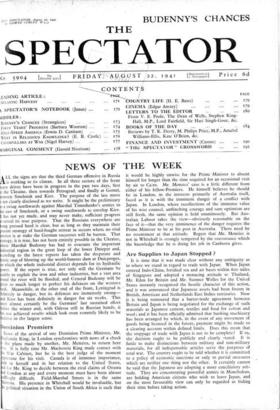Are Supplies to Japan Stopped ?
It is time that it was made clear without any ambiguity as to where we stand in regard to trade with Japan. When Japan entered Indo-China, fortified sea and air bases within 600 miles of Singapore and adopted a menacing attitude to Thailand, Mr. Eden for Britain and Mr. Sumner Welles for the United States instantly recognised the hostile character of this action, and it was announced that Japanese assets had been frozen in British, American and Netherlands East Indies territories. Now it is being rumoured that a barter-trade agreement between Britain and Japan is being negotiated for the exchange of such materials as Japanese cement, textiles and food for cotton and wool; and it has been officially admitted that banking machinery has been arranged by which, in the event of any movement of goods being licensed in the future, payment might be made to a clearing account within defined limits. Does this mean that the stoppage of trade with Japan is not to be complete? If so, the decision ought to be publicly and clearly stated. It is futile to make distinctions between military and non-military materials, for all indispensable articles serve the purposes of total war. The country ought to be told whether it is committed to a policy of economic sanctions or only to partial measures which are neither one thing nor the other. It certainly cannot be said that the Japanese are adopting a more conciliatory atti- tude. They are concentrating powerful armies in Manchukuo, are holding American citizens who wish to leave Japan, and on the most favourable view can only be regarded as biding their time before taking action.


























